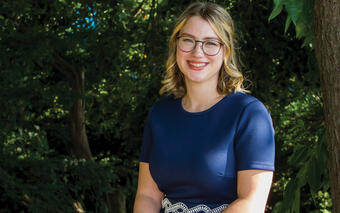Can you walk and chew gum at the same time? If you answered “yes,” and you are 65 or older, the research that Daliah Ross ’24F pursues is for you.
“My research suggests that brains of older adults may work harder to multitask while walking, particularly when they have a thinner brain cortex,” she explains. “When someone’s brain is activating more than another person’s but they are performing at the same or worse level, their brain is acting inefficiently. This may translate into predicting clinical changes, although we don’t know that yet.” Daliah, who earned a four-year merit scholarship to attend Ferkauf Graduate School of Psychology and is now in her fifth year, examined this issue in a study titled “Prefrontal Cortex Activation During Dual-Task Walking in Older Adults is Moderated by Thickness of Several Cortical Regions.”
The paper received the 2022 Edwin B. Newman Graduate Research Award from Psi Chi (the international honor society in psychology) and the American Psychological Association (APA). The prestigious award comes with a cash prize and funding to attend the 2022 APA conference, where Daliah gave a formal presentation on her research. How does she feel about all the kudos? “Very excited,” she shares. “As a trainee, receiving recognition for my work is meaningful both professionally and personally.”
Daliah is hoping her research will lead to practical supports for older adults. She is now working on a new study of verbal memory in adults aged 60 and over who have multiple sclerosis. “I’m aiming to better detect and categorize aging trajectories in different diseases,” she says. “There is so much to still figure out.” Her next clinical placement will focus on movement disorders such as Parkinson’s disease.
Ultimately, Daliah wants to study Alzheimer’s disease and dementia — and any other disease that affects older adults — using neuroimaging tools to understand how the brain ages. Throughout her academic experience, she has felt inspired by those around her. “There’s a listserv for women in neuropsychology,” Daliah explains, and, although she has not experienced bias in her graduate studies, “women uplifting each other is really inspiring.” Ferkauf is a close-knit school, and she has found the student-to-student support to be exceptional. “In some programs, there’s something of a competitive atmosphere,” she says, “but that doesn’t happen at Ferkauf. We help each other.”

